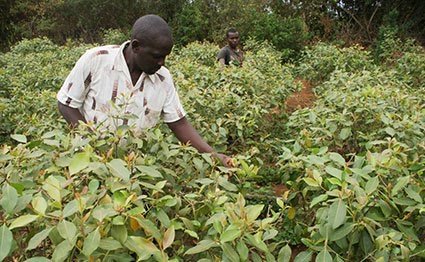Muguka is fast-growing making it less vulnerable to large swings in weather conditions.
A growing number of farmers in Embu County are abandoning traditional crops like maize and rice for the more lucrative muguka.
Muguka is fast-growing, making it less vulnerable to large swings in weather conditions, and uses about half as much water as maize.
Yet, even with all the risks attached to muguka, many Kenyan farmers are hoping it will save their livelihoods.
At this time of year, Albert Njeru’s farm would usually be blanketed with shoulder-high rows of maize. But not anymore.
Now the fields of grain are gone, replaced by 2 acres of bushy green muguka leaves, a potent legal stimulant that relieves fatigue.
“Muguka gives me a lot of money. Farming maize or beans used to give me losses,” said the 45-year-old farmer at his home in Kanyuambora, a village in central Kenya.
As drought and erratic weather wreak havoc across rural Kenya, a growing number of farmers are abandoning traditional crops like maize and rice for the more lucrative muguka.
Njeru can make Ksh30,000 Kenyan shillings ($300) in just one week selling muguka – five times more than he used to make selling maize or beans.
“It is green gold,” he said.
A variety of khat, which produces a mild high when chewed, muguka is fast-growing, making it less vulnerable to large swings in weather conditions, and uses about half as much water as maize, Njeru explained.
The strain grown in Embu County, home to Njeru’s farm, is strong and so consumers can buy less than with the other popular variety, miraa, which is grown further north in Meru.
That is good news for muguka producers like Njeru, who said he was struggling to cultivate enough to keep up with demand.
Food crop shortage
But it is bad news for food supplies, said agriculture experts and local politicians, who warned of a potential food crop shortage as farmers clear their fields of staples to make way for muguka.
“Farmers are not interested in growing maize anymore. They want money in their pockets. Muguka is giving them that and a lot more, since they can use the profits to buy more nutritious food,” said Martin Mwangi, a member of Embu County’s assembly.
“But the long-term consequences could lead to food insecurity due to reduced production.”
He pointed to neighbouring Kirinyaga County, where farmers are known for growing Kenya’s highest-quality rice.
“Water used for irrigating rice is now being diverted into muguka fields,” he cautioned.
Drugs or food?
There is no official record of how many farmers have switched from growing food crops to muguka, said Mwangi.
Nor is there data on how much land is being used for muguka, according to Kenya’s Agriculture and Food Authority (AFA).
But Francis Kimori, chairman of the Mbeere Muguka Farmers Sacco, a savings and credit cooperative, estimated four out of every five households around the Mount Kenya region, including in Embu County, are farming the stimulant in some quantity.
Many have upgraded from mud huts to modern stone houses, he told the Thomson Reuters Foundation.“It is changing livelihoods,” he added.
Factors like failing rains and new pests, linked to climate change, have likely played a role in muguka’s popularity at the expense of time-honoured crops such as maize, said Dickson Kibata, a technical officer at the AFA.
Yet despite the extra income muguka brings, Kibata warned against relying solely on the narcotic plant.
“Cash-crop farming cannot be the silver bullet that will pull farmers out of poverty, because consumption patterns keep changing,” he said by phone.
“My advice to muguka farmers is to mix it with food crop farming to ensure the family food basket is secure, even as they look for money.”
Forest warning
Environmentalists and lawmakers have also voiced concerns over the impact of the stimulant cultivation boom on forests.
Every few months, the Atiriri Bururi ma Chuka community conservation group in Tharaka Nithi County reports several locals illegally growing an edible form of cannabis known as bhang in local forests, said its chairman Ngai M’Uboro.
He expects it is only a matter of time before he and his colleagues start uncovering muguka farming in the area.
“If the forest is already suffering because of grazing and bhang, it will not be long before we see muguka growing in the forest,” he said.
Muguka’s potency is also making the authorities uncomfortable. In 2018, legislators in Mombasa and Kwale counties lobbied unsuccessfully for a sales and consumption ban on muguka over fears of addiction among young people.
The National Authority for the Campaign Against Alcohol and Drug Abuse supported the move, citing social and health worries.
“Muguka is worse than hard drugs because of its highly addictive nature. It is ruining homes, the country’s youth and should be banned,” said Victor Okioma, its chief executive.
Supermarket shelves?
Yet, even with all the risks attached to muguka, many Kenyan farmers are hoping it will save their livelihoods.
Along a 300-km stretch of cropland from the edges of the capital Nairobi to the lowlands opening into northern Kenya, maize farmers have been struggling with drought.
Purity Muthoni, 32, a farmer from Kiriani village in central Kenya, said she would not hesitate to switch to muguka if she could. But the weather and soils where she lives, some 150 km from Njeru, are not suitable for growing the plant, she said.
Noting the risks of depending on one crop as a source of income, the Embu County government last year said it would start distributing macadamia and avocado seeds to farmers to help them diversify their cash crops.
But Njeru is not convinced any other crop can earn him the same returns he gets from muguka.
If local leaders really wanted to help farmers, he said, they should find ways to add value to the plant by enhancing their access to industrial processing and retail opportunities.
“I will be very happy the day I see packaged muguka being sold in supermarkets as a quality-assured product,” he said.








